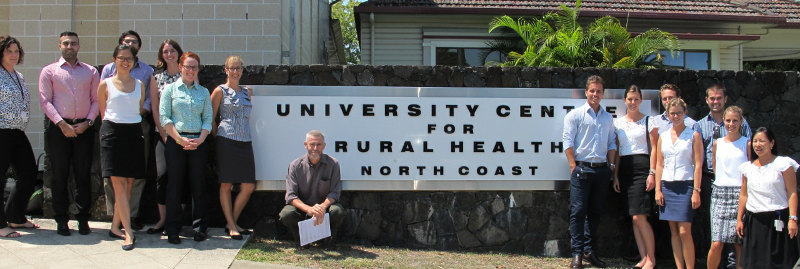As the year of 2014 winds down, the University Centre for Rural Health North Coast (UCRH) is celebrating an ‘annus mirabilis’ (year of wonders), having hosted its largest ever number of university clinical students undertaking placements in GP practices, hospitals and clinics throughout the Northern Rivers.
A number of UCRH placement students have graduated at or near the top of their academic programs, and more of them than ever are choosing to return here to take up work opportunities after graduation.
In addition, several major initiatives were launched, and research staff recognised nationally through prestigious grants, scholarships and appointments to high level boards.
Reviewing the year, UCRH Director Professor Lesley Barclay AO said, “We received very positive feedback from medical and allied health students from the Universities of Sydney, Wollongong and Western Sydney who have done their clinical placements in the Northern Rivers.
“They report great benefits from the experience and mentoring provided by the wonderful professionals in our hospitals and other health care settings. Many students who do their practical training here are returning to the area to take up local work opportunities, for instance as interns at Lismore Base Hospital.
“This is excellent news for boosting the clinical workforce in regional areas, locally and around Australia. The UCRH is playing a national role in making high quality health services more accessible to rural residents, and leading or contributing to milestone research work.”
Professor Barclay said UCRH’s major achievements for the past year included –
-
Two prestigious fellowships, from the NHMRC and the Cancer Institute NSW, awarded to UCRH research director, recently promoted Associate Professor Megan Passey, to undertake research to help reduce harms from tobacco use. Assoc Prof Passey is also a member of a team awarded a NHMRC Partnership grant of $1.3 million over five years to develop and evaluate improved models of maternal health care for Aboriginal and Torres Strait Islander women. This includes trialling an innovative approach to supporting pregnant women to quit smoking.
-
An internationally recognised study by UCRH’s Dr Judy Singer and others showing the value of complementary and alternative medicine in contributing to the care of patients/clients accessing hospital and community-based services.
-
The launch of an innovative training program ‘R U Appy’, Commonwealth-funded with UCRH as a key partner, which helps Aboriginal and other health professionals better use apps and internet-based programs with Aboriginal and Torres Strait Islander clients.
-
High-level usage of the state-of-the-art Nyumbalighu Simulation Centre, opened late in 2013, which provides hands-on training for students and local health practitioners, and gives high-schoolers considering medical careers a taste of clinical education.
-
The upgrade of the Clarence Health Service Education Centre at Grafton Base Hospital, which coordinates a ran of educational activities for more than 350 students placed in the Clarence Valley. The Grafton campus is a key part of UCRH’s regional education network that includes Lismore and Murwillumbah.
-
The selection of UCRH Pharmacist Academic Lindy Swain as the national Pharmacist of the Year by the Pharmaceutical Society of Australia. Ms Swain was also appointed to the board of the National Rural Health Alliance, Australia’s peak non-government organisation for rural and remote health. Prof Lesley Barclay is also a Board member.
-
A hospital-based study of how hospital admissions experienced by patients with chronic disease might be reduced. Diagnosing Potentially Preventable Hospitalisations is based in Port Macquarie and Coffs Harbour in collaboration with Mid North Coast LHD, North Coast Medical Local, and NSW Agency for Clinical Innovation. The University of Western Sydney is also involved.
-
A study on the health outcomes of long-term cannabis use focused on comparing the wellbeing of regular tobacco and cannabis users.
-
A study by leading scientists including UCRH epidemiologist Dr Geoff Morgan about the impact of unusual heat events on people with serious illness. A key finding was that extreme temperature risks can be reduced through public health messages offering simple, practical advice.
Federal Member for Page, Kevin Hogan congratulated UCRH for what he called “an outstanding year under the guidance of Director, Professor Lesley Barclay and her dedicated team.”
Mr Hogan added, “The scope and depth of their work over the last 12 months shows the talent and can-do attitude of the staff at UCRH. Their work is crucially important in addressing rural health issues from a distinctly rural perspective, and ensuring that regions like ours are not disadvantaged in health care simply because we choose to live in a regional area.”
















